Get posts by email
Imagination, Creativity & Dress-Up Live Here (still)
November 26, 2013
I keep wondering when Halloween will end in our home. (I know Halloween was almost one month ago but I was waiting for permission from folks before quoting them in this post.)
I wonder when I can be done with the guilt about sugar-overload (which I no longer fight but allow for a short period of time before returning to our normal dietary guidelines.)
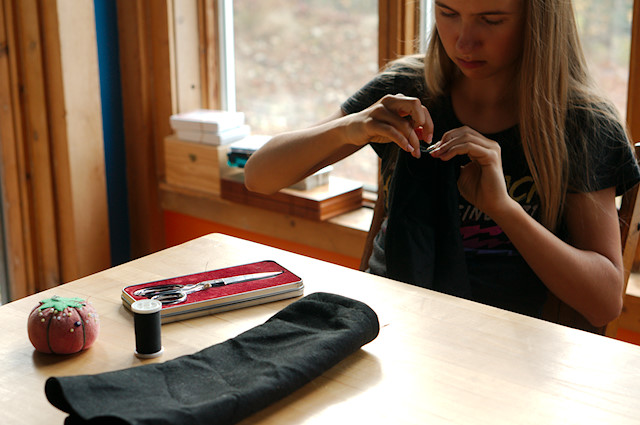
I wonder when the costume shoppe will be closed, and when the eager anticipation of walking darkened streets on the last day of October will pass.
It was going to be just Brienne this year. Dressing up and going out for treats. The other two weren't interested.
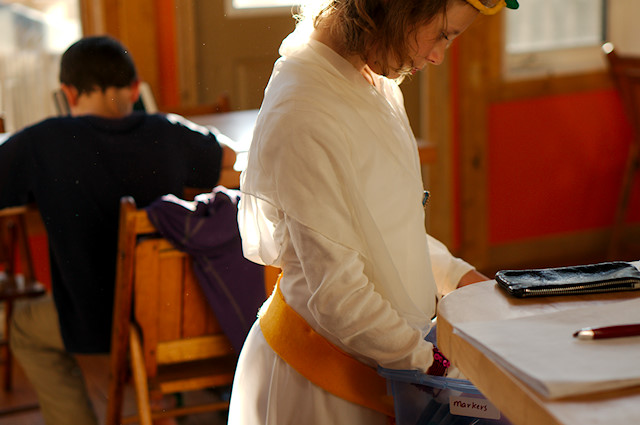
Then Celine was invited to an online Halloween party with friends on the 30th, and other friends (of the local variety) were trick or treating on the 31st. And what was going to be a quiet Halloween year became what we have come to know and love - an expression of imagination, creativity, and dress-up.
This summer I joined an unschooling Yahoo group. We're not unschoolers but Celine's high school education is almost completely self-directed and self-regulated (with parental oversight). I find the most support for this kind of education in the unschool crowd.
So anyway, I'm on an unschooling mailing list and last month an interesting thread was started with this question:
(This is related to Halloween, more specifically dress-up, so hang with me.)
...I have seen in many, many unschoolers how the younger children (ages 4, 5, 6) seem so much less mature than their schooled peers. They are not less mature, they are just maturing at a normal rate in safety as opposed to most schoolers who are pushed to handle more than the are ready to deal with and thus are forced to find ways to cope. However, they seem more mature, in the way our culture thinks of maturity. Then, by 9, 10, 11 they seem and actually are much more mature than their schooled peers. I have seen this again and again. My question is this: is there a similar dynamic happening for young teens? Does a, say, 13 year old unschooler often/sometimes seem less mature than his/her schooled peers and then gain that true maturity a few years later?? Have those with older unschooled children seen this dynamic in their kids and/or other unschooled teens you have known?
Heidi
The responses to this question were fascinating and I hope to delve into them more in future homeschool posts on the subjects of socialization, relationships, separation, attachment etc.
But what I want to share in this post are some of the responses to that question, as related to playfulness.
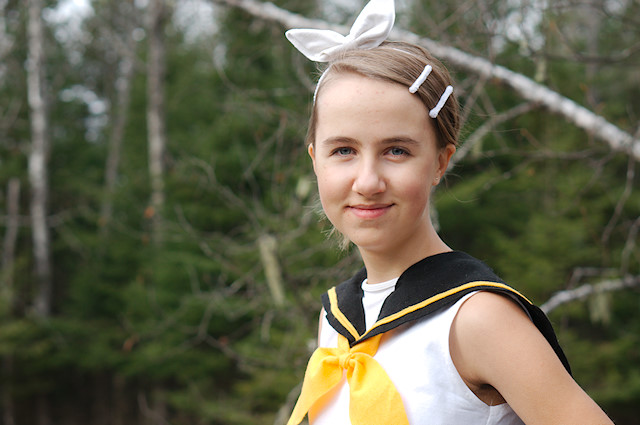
(My kids) are now 12-16, and are definitely more playful and imagination-based, even in the teen and preteen stages. Still into costumes, kooky movie-making, story-telling and "making funny stuff" with each other and close friends. So child-like in that way. But they've also operated the stove and knives for years, and can feed themselves, and have all been doing their own laundry and packing their own suitcases for a long time.
...I would say, as many of you will also notice in your kids, that in unschooled kids there is an emotional maturity or understanding that has been allowed to brew and develop outside a schooly template. All their friends like to hang out with them, because they are supportive, listen, empathize, and are into consensual play.
Cath
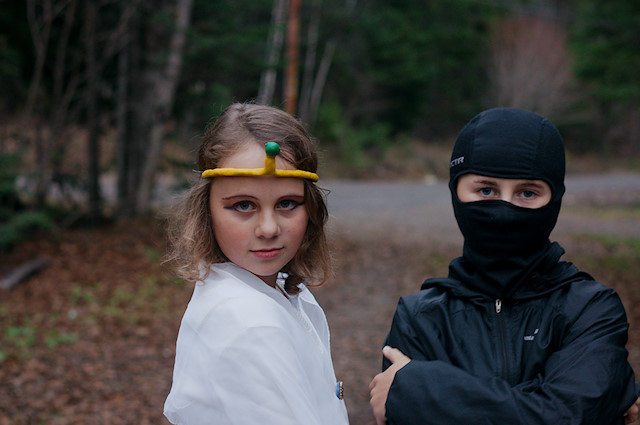
I certainly noticed a lack of crushing under peer pressure that their in-school friends seemed to really like being around... My kids played imagination games, and just a lot more play, than is ‘normal’ at 13-14 when most kids are pushing for rebellion, makeup, sex, drinking... and practically nothing else.
And, again, we also noticed that by 16-17 they were long past their in-school cohorts. Independent travel, working full time, friends in their 20s...
Linda
I would echo that they were like someone posted here - into more play than what schooled teens were into that were "too cool" to play. Even now, when they come home from university they still play with the 11 year old, at his level, with board games, lego, dress-up in the halloween costumes, art projects etc.
Of course, they are going to Overdose on League of Legends this weekend, but they still play with toys! I remember at that age, 13-14, my daughter parted with her best friend because the friend was into make-up, boys etc and my daughter wasn't. (She is certainly into that now). My daughter felt that birthday sleepovers were very boring because the other girls complained about boyfriends and their moms, and my daughter didn't. It got so that she didn't go anymore. Very different interests. Maybe that happens in unschooled kids too. They spent a lot of time reading and imaginary play at that age. It was so much fun. I really miss it.
Judy
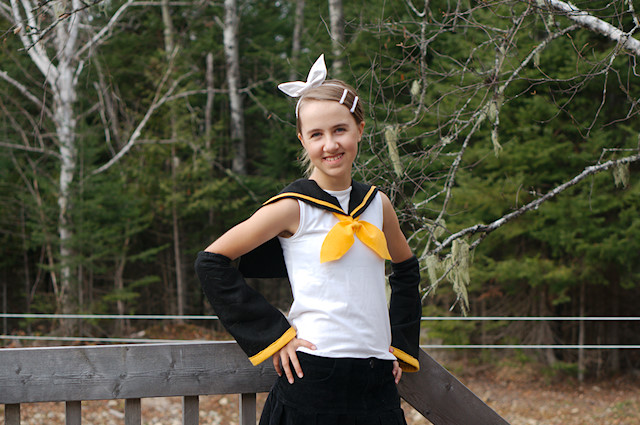
And another mother also shared how, in her experience, young adult unschoolers "hold both maturity and playfulness simultaneously - they aren't mutually exclusive."
My daughter, at 18, moved on her own to NYC, and has lived there for almost a year and a half (minus a couple months of US visa application). Very self-sufficient and mature. Yet she's also well-loved in her circle of photographers for her playfulness. In fact, her photography is all about seeing the world through a child's eyes. Her guiding quote is from Walt Disney: "Every child is born blessed with a vivid imagination. But just as a muscle grows flabby with disuse, so the bright imagination of a child pales in later years if he ceases to exercise it."
FIMBY is not a unschooling (or any specific educational philosophy, for that matter) blog. It's a family blog.
And in our family, our kids dress-up, often. They did when they were little and they do so now, when they're not so little. Though I know I will look back on these years and remember fondly "when they were little".
When friends with young children come over Laurent dons his Ninja outfit and stalks around the house ready to pounce - to the sheer delight of little boys.
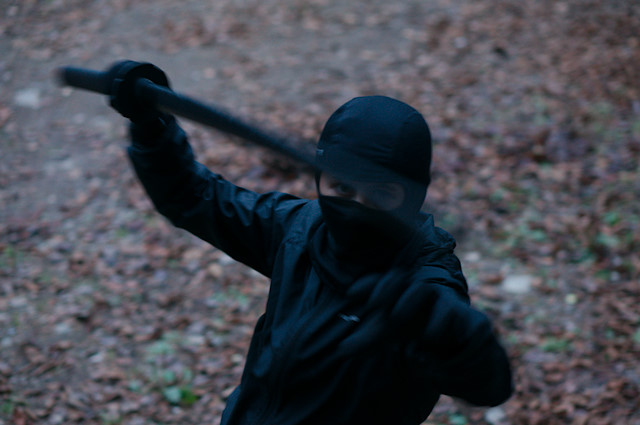
Out come the foam swords Damien made for the kids years ago. Almost 13 year old Laurent has been known to take quite a beating from his 3, 4 and 5 year old adversaries as they play "chevaliers" (French for knights).
Our 14 year old is less into "dress-up" but is fascinated by Cosplay, sewing her own costume, and spending time hanging out on blogs where geeky grown-ups sew and craft elaborate costumes of their favorite characters.
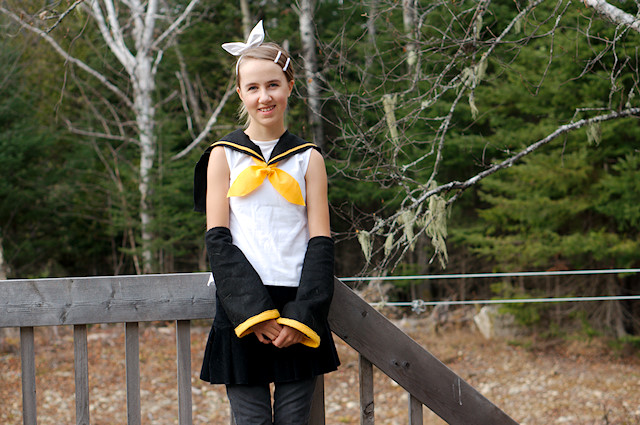
Interestingly, and not surprisingly, cosplay is a pop culture phenomenon in Asian cultures, such as Japan, which is a current study subject for Celine.
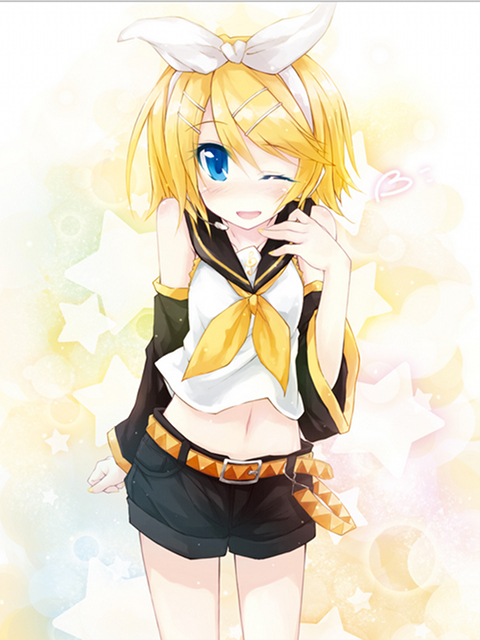
Eleven year old Brienne has a dress-up bin with which she outfits herself on a regular basis to become different characters. A girl who lives in a "manor-house" (and speaks with an affected British accent) or the daughter of a Menhir merchant.
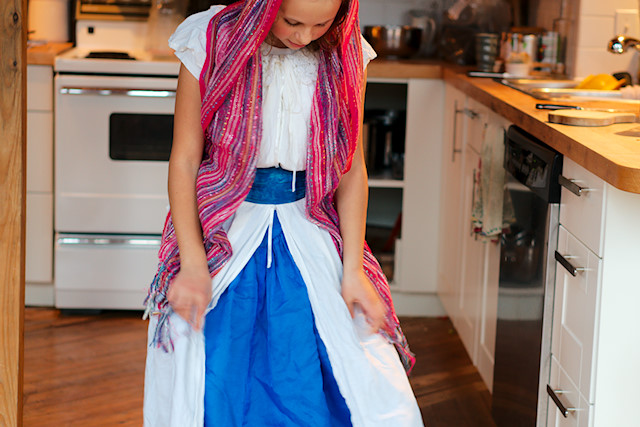
The Menhirs are a made-up people group, allies of the Domeheads, archenemies of the Squareheads and Spikas. They set up camps, fortresses, cities, and dwelling throughout our woods.
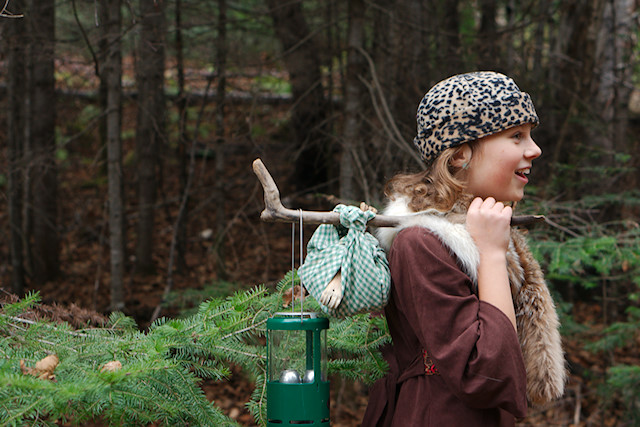
I don't think this is an unschool thing. Or even a homeschool thing. Pulling quotes from my unschool mailing list was not about setting up unschool as the example. For me, it was an affirmation. Because, as I share my own reply to that mailing list thread, imaginative play is alive and well in our home.
This is a fascinating discussion and I have observed the exact same things in my own children ages 14, 12 & 11. A slower start, very attached to me as young children, not sure what to make of large groups of kids etc. But as they grow they become confident and comfortable in their skin at the very age everyone around them is struggling with issues of identity etc. And yes, a slower teen maturation (thankfully!)
And what you all said about play - absolutely. My 14 year old loves cosplay... It's a very natural progression of her interests in sewing, design, fantasy fiction and overall geekery. She's a geek and proud of it.
I don't know if my kids would still have these interests if they were schooled. And I suppose it all depends on what type of school they would attend, if they attended.
But I do doubt that they would have the time or opportunity to weave their imaginative dress-up play into their school day and actual academic study, unless they were drama majors.
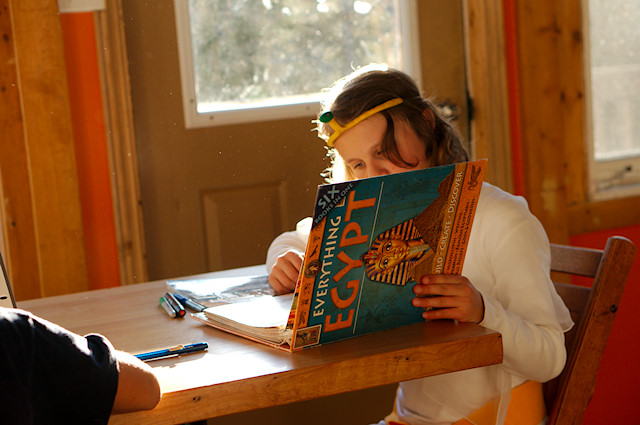
In our home, math is not more important than sewing and science is not more important than story telling. There's room for all of it. And it comes all together in the most unexpected and delightful ways.
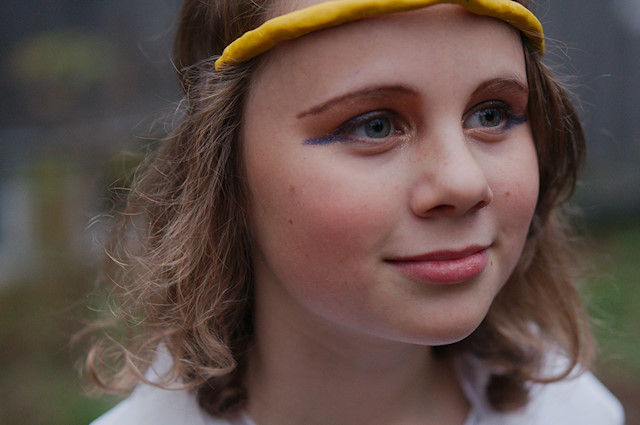
Brienne's studies seamlessly merge with her play as she researches Egypt to prepare for Halloween. (And what a great opportunity to wear a lot of eye make-up!)
Laurent can live his martial art fantasies of being a stealth Ninja, training with a daily exercise regime for gaining strength for his Taekwondo competition.
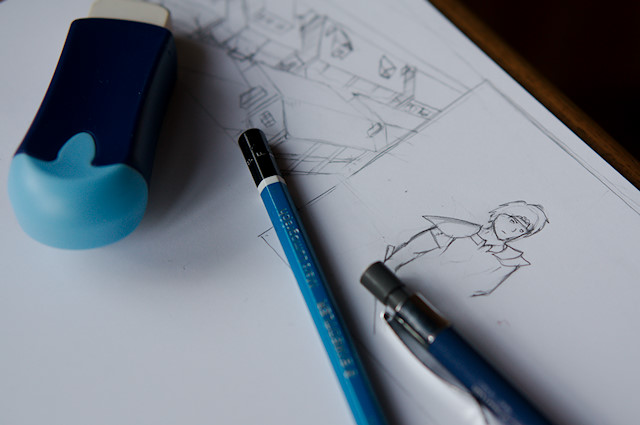
Celine can study and listen to vocaloid music (google it), learn to speak Japanese (and practice with said music), cosplay, read and draw manga, write character histories for game play and it's all learning. All the time. All connected by threads that can only be woven by her.
We all know the importance of play for young children. As my children get older their play changes but they still play.
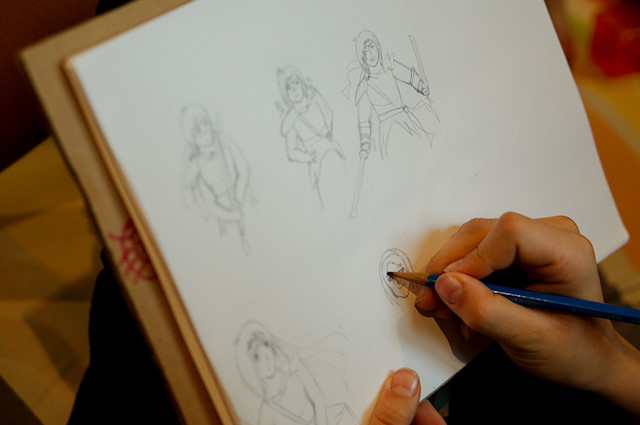
Maybe if more older children and young adults were still able to express themselves through creative play, and it was socially acceptable in their home and school environment to do so, they would seek less destructive expressions of individuality, those listed in one of the comments above as rebellion, sex, drinking.
I'm not an expert and the interplay of social behavior and self expression is a complicated business. It's not just about play, I realize that.
But freedom to play and express creativity through all stages of childhood, and adulthood, is so important. And I wonder how many destructive societal activities and social behaviors, especially those of teenagers, would be avoided all together, or could be better channeled, with a cultural and personal history of play and creative expression.

Teenagers want to be weird, wacky, and daring (and still be accepted and loved). Little kids want to inhabit a world of fairies, Menhirs, and Ninjas. They are expressions of the same thing - imagination, and creativity. Play.
Resource Library
-

Tonya on Nov. 26, 2013, 6:39 p.m.
I love that about being mostly home based (not with peers so much) that children are free to do this. Our oldest, at almost 20, who does happen to be theater major, still loves putting on costume whenever he gets the chance or excuse, like Halloween, for example.
-

Sarah on Nov. 26, 2013, 7:53 p.m.
What an interesting reflection on play and how we should feel allowed to extend it into the teenage years (and beyond). I'd never thought of the teen identity/rebellion "crisis" as a manifestation of frustration about the lack of creative outlets for teenagers (which I consider "high-school age" as it is more about age and less about stage--how else to define such a diverse group?). So, so interesting. I have thought about how teenagers (ok, me, myself) have felt confused because of the compartmentalization of our lives (and specifically our learning). Right now, I'm in bliss because my school studies are fitting together to make a more complete picture (learning about the ethics of synthetic genetics, the history of eugenics in the U.S., the tension between black and white feminists (in poetry, specifically), the system of "Bantu" education during apartheid, using statistical analysis to analyze experiments...). Each of my studies is complementing the other in ways I couldn't imagine--kind of like Céline's studies :). Unfortunately that's all coincidence. I guess what I'm saying is that for me, part of my identity struggles in hs were because I felt confused and overwhelmed by disjointed ideas (compartmentalizing, deadlines, schedule organization... not my best learning style). I do think that it has been important for me that I learn to function with those things, but it was a overwhelming process. Also, there is definitely a sense of a shortage of time that keeps teens from personal creative expression--without a doubt.
"Teenagers want to be weird, wacky, and daring (and still be accepted and loved)." Oh, I so agree. SO SO SO AGREE! I do think that perhaps some of the rebellion comes from not being able to be wacky, weird, and really, themelves. While of course I care what peers think of me (and I think to some extent I should--I think types of peer pressure makes people behave kindly, etc.) in some ways I feel like I got that out of my system earlier than most (before middle school). By the time I was 11 or 12 I felt a strong sense of identity and while that identity has changed, I think that my valuing my sense of self has not (if that makes sense...) For those teens who don't feel like their "true" self is valued by others or who don't value their own individuality... I think that being a teen is really hard. And so yes, some turn to other sources of affirmation for that.
Last year in psychology we learned about Erikson's stages of psycho-social development and one of the criticisms of his work is that his stages (basically defined by an identity crisis of that particular stage) are really just societal constructions. Meaning that the identity crisis of adolescence may just be a result of our culture. Another perspective on that is reaserch profiled in Nurtureshock, which I am reading right now. While my stats class is teaching me to be much more critical of the studies the authors talk about (sample size of 10.... really?) and the generalizations the authors make, one interesting study talked about how teenage behavior (specifically risk taking) actually has a nuerological basis and that there may be a gene that makes it more or less prevelent for some teens. Also, perhaps the lack of rebellion/abundance of play in unschooling families is not just the result of the time/freedom/lack of peer pressure/structure of the unschool (ironic phrase there) but of the values of the family choosing that path...? Just a thought.
Ok, I promise this is my last thing I'm going to say. I don't know what it means in the context of your musings, but Cosplay is big at my school (perhaps b/c of the demographics? we have a lot of geeky teens, and we're on the west coast which both means a significant east asian cultural impact and lots of asian-american students). There is a significant group who is part of the Fanime club, reads/watches anime, dresses up (sometimes to school), goes to cosplay conventions, some draw anime-type characters...
Ok, one more thought. (Sorry!) I think that maturity is really really complex and that most often people are mature in some ways but not in others... and honestly, I think that continues into adulthood. I know many "mature" adults (my parents included) who are reflective, caring, and responsible... but can't take criticism. They are mature in many ways... but not in others. So, in that vein, I think that homeschooling/unschooling can help children mature better/more quickly than traditionally-schooled peers in some ways (interaction with adults, responsibility, sense of self), and that traditional schooling with many diverse peers (with different family values, etc) can help encourage other types of maturity. That's not to say that the one group cannot gain the other type of maturity, just that based on the structure of their schooling/parents parenting style/family values, that type of maturity may not come as quickly, etc. Also, I think that there is a sense that being jaded is being mature--NOT TRUE, in my mind--and I bet that homeschooled/unschooled children lag behind traditionally schooled kids on this one.
Well, thank you for this conversation and your reflections/perspective. Really interesting.
-

Sarah on Nov. 26, 2013, 8:54 p.m.
Also.
I was sorry to hear about your grandfather. Sending healing thoughts.
-

renee on Nov. 26, 2013, 11 p.m.
Sarah, as always I appreciate you young adult perspective on young adult issues (smile). I'm going to respond to your comment backward, addressing your last points, first.
Maturity is complex. Absolutely. I'll tell you right now I'm immature in ways I wish I wasn't and my kids are definitely immature compared to their schooled peers in some areas. There was interesting discussion in the e-mail group I refer to in this post on that very issue, where our homeschooled kids lag behind and where they pull ahead (even though we all talk about how we don't like to compare our kids!)
Celine would like your school I'm guessing, though she's pretty independent so I have a hard time seeing her choosing to give up a lot of her self-directed time for regular school studies. I think she'd love to go to a Comic-con or cosplay or larp sometime. Maybe on our trip out west in a couple years. I've never experienced any of these first hand, but I live in the woods in a rural east-coast Canadian village!
Re: the "construct" of adoloscence and risk taking behavior etc... Over the last few years I've tuned more into this discussion of the teenage brain. I haven't read any books on the subject, just online articles, etc. It's not hard for me to imagine or believe that the teenage brain is different than the adult brain. It seems kind of intuitive, even if adoloscence is a construct of our society. There was no adoloscence as know it years ago and it may still be this way in other cultures and societies (very non-western ones.) But the risk taking behaviors associated with modern teenagers could have simply manifested themselves differently in previous ages and places.
Also, you say, "perhaps the lack of rebellion/abundance of play in unschooling families is not just the result of the time/freedom/lack of peer pressure/structure of the unschool (ironic phrase there) but of the values of the family choosing that path...? Just a thought"
Absolutely. The older my kids get the more hesitant I am to write any definitive cause and effect type stuff about homeschooling, parenting, etc. Because there are so many variables. I could say "homeschooling produces kids who..." when in reality it's not homeschooling (unschooling, whatever) but the family culture, etc. that produces that type of kid. This is not science. And homeschoolers are not immune from rebellion, nor should they be. Nor is all "rebellion" bad, as young people have to reject, or at least question and form their own opinions, some of what they have been taught and raised with, in order to become their own people.
Now to your first paragraph: "I'd never thought of the teen identity/rebellion "crisis" as a manifestation of frustration about the lack of creative outlets for teenagers..." Even though I pose the question in this post it's not a theory I'm willing to hang my hat on. It was just an idea I'm playing with. Play and creativity is not the panacea to all socities ills.
I think what I was trying to express more, now that I think about it, is the frustration young adults feel about the lack of time/support/resources to pursue what the studies they want (which might include play) while they are required to study subjects they care little about, and also what you mention - the compartmentalizing of learning.
You say: I guess what I'm saying is that for me, part of my identity struggles in hs were because I felt confused and overwhelmed by disjointed ideas (compartmentalizing, deadlines, schedule organization... not my best learning style).
I think this is huge for a lot of students. It's overwhelming and there is the pressure of "you must be done your secondary education by this point". So, not only are there individual deadlines but there are always dates looming - the end of one school year, the beginning of the next, graduation, college apps, etc.. All together it's a lot of pressure, no wonder young adults need to let off steam and do so sometimes in destructive ways. No wonder also, that there is little time for play (whatever that looks like for the individual). Play for play purpose, not play for their college application.
Not that I think deadlines are a bad thing. Deadlines are helpful for getting things done, actually moving forward on your goals. The question is "are they your goals, or one's someone else is placing on you". I don't mean you specifically.
I'm so happy that the pieces of your education are fitting together for you so well this term, in such unexpected ways. I hear your happiness and it makes me happy also. I felt the same way in my last years of my undergrad degree. Finally, it was all coming together. I thought at that point I would like to continue my education and get a masters in education but then we decided to have a family and my formal education ended there and the practical application of it all started!
Also wanted to mention the blog Exuberant Animal. You might appreciate Frank Forencich's writing, he writes about the role of play and nature in adult life (and society in general).
-
-

Danielle Lyndon on Nov. 26, 2013, 7:53 p.m.
Great post! Can Damien explain how he made the swords. I'd love to make them
for my nephews.
Thank-you. Danielle.
-

renee on Nov. 26, 2013, 10:06 p.m.
Danielle, basically like this.
-
-

Carol on Nov. 27, 2013, 1:11 a.m.
I consider play an absolute necessity in developing scientific thinking. There is little need to teach the scientific method (aside from the vocabulary) if we allow children enough time and material to develop it on their own. They naturally make hypotheses, set up experiments, collect data and draw conclusions. It is part of play. Here at my house most play revolves around science and engineering.
Interesting adults still play. We might call it having hobbies or cooking dinner or the fun part of our job.
-

renee on Nov. 27, 2013, 2:13 a.m.
What great connections you make between play and science. I wasn't even thinking about that in the context of this post but you are so right. Interesting also how play at your house takes on a scientific bent, at our house it's more artsy, I'd say.
-

Carol on Nov. 27, 2013, 3:01 a.m.
This is one of the best things about homeschool blogs. I love seeing how different families learn many of the same concepts and skills through the pursuit of vastly different interests.
-
-
-

Ruth L on Nov. 29, 2013, 3:11 a.m.
Renee, I love your kids and their unique creativity. I just find them and their activities so refreshing compared to what is considered the 'norm' in that age group. May they continue to develop and foster their passions and inspiration as part of what makes them tick.... give them hugs for me - they're special!~!
Auntie Ruth
-

Shelly on Dec. 15, 2013, 12:14 a.m.
I love to see my kids go through childhood at their own pace. Preteens and teenagers unashamed to play dolls, school, and "cheese touch" with their younger siblings. On a side note, Celine reminds me so much of my 14 year old daughter. She goes to Cosplay conventions, loves anime ( we just had to watch two more Studio Ghibli movies from the library), learned basic Japanese (also compliments of the library), went to a Shinobi camp at our church this past year, loves WOW, and is now taking a flash animation course at the local art school. When you write about your daughter, I feel like I'm reading about mine. It's so funny.
-

renee on Dec. 15, 2013, 3:14 a.m.
Shelly, I'm envious (on Celine's behalf) of all the resources your daughter has access to. We have very little locally to support Celine's interests so we use the internet a lot (smile). Off to ask Celine about Studio Ghibli....
-

Shelly on Dec. 15, 2013, 4:03 a.m.
The fact that you're envious makes me smile, not out of malice, but because I envy your ability to go on these fantastic adventures like your AT thru hike. While we do have resources that I am grateful for, there's a price. We live in the city with a yard the size of a shoebox. Ten out of my eleven children still live at home, and they all love the outdoors, but our little yard just doesn't cut it. In order to actually have room for them to explore, I have to line them up and walk them to a creek about 20 minutes away. Now a twenty minute walk would normally be very enjoyable, but sometimes the little ones can be antsy, so I feel like I'm spouting off instructions the entire way. Also, since I'm in a season of life where I do have so many little ones, my kids are 20, 14, 13, 12, 9, 8, 6, 5, 3, 2, & 7 months, I don't get to do much. I always jokingly tell my husband that when the youngest is old enough, I'm going off to join the BFRO (again, jokingly) so I can romp around in the woods. That's okay. I'll live through your adventures for now. :)
-
-
You can subscribe to comments on this article using this form.
If you have already commented on this article, you do not need to do this, as you were automatically subscribed.






Sarah Mast on Nov. 26, 2013, 2:59 p.m.
Play is a really fascinating topic. I'm reading Peter Gray's "Free to Learn" book right now (about halfway) and while at times it's a bit dry, the topic is fascinating. It's all about play from history (hunter/gatherer play and society) up until now. His premise is basically that we, as a society, are loosing touch with creativity in solving problems, art, etc. because we (as kids, and also kids now) are just not given time to play.
If this topic interests you, I think you'd enjoy the book. http://www.freetolearnbook.com/
I sometimes think we never have enough time to do all the things we want to in a day. Not for lack of time per se, but for too many hobbies! That's a good problem to have, though. :)
Sarah M
renee on Nov. 26, 2013, 3:06 p.m.
I don't want to view time as the enemy, I'm trying to change my mindset to an expansive view of time (works against my personality grain, but I'm trying) but even so time flies in our home. Flies. For the exact reason you say. There are so many things each of us want to do in a day and never enough time. Scratch that, enough time, enough time, enough time... (smile).